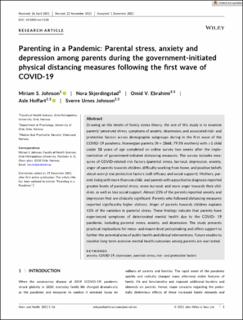| dc.description.abstract | Drawing on the tenets of family stress theory, the aim of this study is to examine parents' perceived stress, symptoms of anxiety, depression, and associated risk- and protective factors across demographic subgroups during in the first wave of the COVID-19 pandemic. Norwegian parents (N = 2868; 79.5% mothers) with >1 child under 18 years of age completed an online survey two weeks after the implementation of government-initiated distancing measures. The survey includes measures of COVID-related risk factors (parental stress, burnout, depression, anxiety, anger of parents towards children, difficulty working from home, and positive beliefs about worry) and protective factors (self-efficacy and social support). Mothers, parents living with more than one child, and parents with a psychiatric diagnosis reported greater levels of parental stress, more burnout, and more anger towards their children, as well as less social support. Almost 25% of the parents reported anxiety and depression that are clinically significant. Parents who followed distancing measures reported significantly higher distress. Anger of parents towards children explains 41% of the variation in parental stress. These findings indicate that parents have experienced symptoms of deteriorated mental health due to the COVID- 19 pandemic, including parental stress, anxiety, and depression. The study presents practical implications for meso- and macro-level policymaking and offers support to further the potential aims of public health and clinical interventions. Future studies to monitor long-term aversive mental health outcomes among parents are warranted. | en_US |

